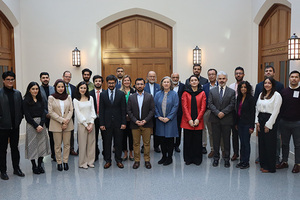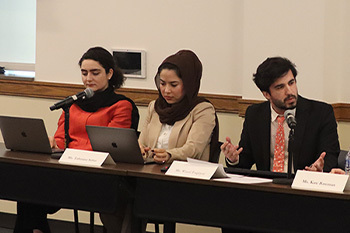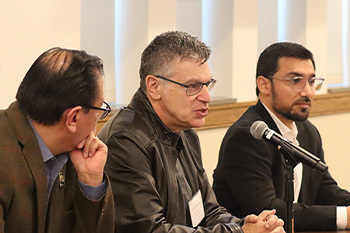
As the 2023-24 academic year began to wind down, the Afghanistan Program for Peace and Development (AfPAD) was instead ramping up its schedule.
Part of the Mediation Program at the Kroc Institute for International Peace Studies, AfPAD hosted and organized a two-day colloquium April 25-26 in partnership with the U.S. Institute of Peace (USIP) and the American Institute of Afghanistan Studies (AIAS). “Generating a Political Process in Afghanistan” attracted 29 Afghan scholars, academics, and practitioners from around the world to the Keough School of Global Affairs at University of Notre Dame, where they presented their research and papers and engaged in discussion about the kinds of efforts needed to generate a political process in Afghanistan.
This year’s gathering was the third such colloquium focused on Afghanistan. Last year’s event took place at the University of Pittsburgh, with the inaugural launch being held in early 2022.

“It was an honor to host such an esteemed, diverse group of individuals from a variety of Afghan communities at Notre Dame, together with our partners USIP and AIAS,” said Aref Dostyar, the advisor and program leader of the Kroc Institute’s Afghanistan Program for Peace and Development, who orchestrated and managed the colloquium at the University. “It was a ‘think tank’ of sorts, coming together to share ideas and energy about Afghanistan’s potential and future.”
Colloquium organizers sought to maintain attention on the conflict in Afghanistan, a focus at risk of being forgotten given more immediate wars in Gaza and Ukraine, and other current global crises and natural disasters. Structured appropriately, organizers believed the colloquium discussion could address the Taliban regime and its unwillingness to enter into formal dialogue with other local political groups. Other topics might include the structure of opposition movements – how organized are they? – as well as social, political, security and economic issues at play.
A call for abstracts was put out, asking applicants to describe the actors and efforts, indigenous and international, that could generate a political process in Afghanistan and respond to the immediate and long-term dynamics of the conflict. Volunteers from the three organizations read more than 100 submissions and ultimately chose 20 papers, inviting the authors to come to Notre Dame where they would engage in scholarly discussions and receive peer and expert feedback on their papers.
Professors, lecturers, visiting fellows and doctoral candidates were among the attendees representing Columbia University, Oxford University, American University of Afghanistan, and Georgetown University, among others. A handful of participants joined the meeting virtually due to VISA issues preventing them from traveling.
“Our discussions over the two days led the collective group to outline high level policy recommendations for international actors who want to open dialogue among Afghans, breaking from the ongoing political impasse,” said Kate Bateman, senior expert on Afghanistan for USIP.
One such recommendation was to make the United Nations-led process in Doha more inclusive of Afghan political groups, including coalitions formed by politicians and civil society activists. Another was to sync macro-level political pressure on the Taliban by the international community with micro-level initiatives led by local Afghans. Yet another was investing in local media to counter Taliban propaganda.
Such recommendations were complemented by suggested entry points for dialogue – on apolitical topics like cultural heritage, climate change and the private sector.
“These serve as practical, innovative anchors for Afghans to address and deliberate on, to get the conversations started, as the time isn’t right to engage the Taliban and opposition groups in formal political negotiations, ” said Omar Sharifi, senior research fellow and Kabul director of the American Institute of Afghanistan Studies.

The group also addressed traps and patterns that serve as lessons to be learned from Afghanistan’s history as they seek a better future for the country. Among these included hyper-centralization within the government, toward theocracy; a lack of attention to or acknowledgement of past grievances; and ethnicized governmental administration without diversity.
To continue the conversation, Dostyar met up with some of the colloquium participants to attend a four-day workshop, “Using Deliberative Technologies in Polarized Context,” also held at Notre Dame in late June. Sponsored by the Toda Peace Institute, the workshop explored the design process for using deliberative technologies such as Polis, Remesh and other AI-powered platforms used for dialogue and deliberation in conflict zones, such as Afghanistan.
“Both of these events, they’re the kinds of opportunities that we need to elevate the critical thinking and learning necessary to strategically contribute toward peacebuilding in Afghanistan,” said Dostyar.